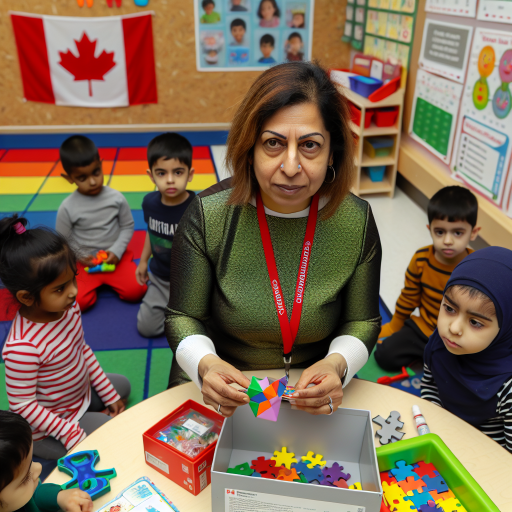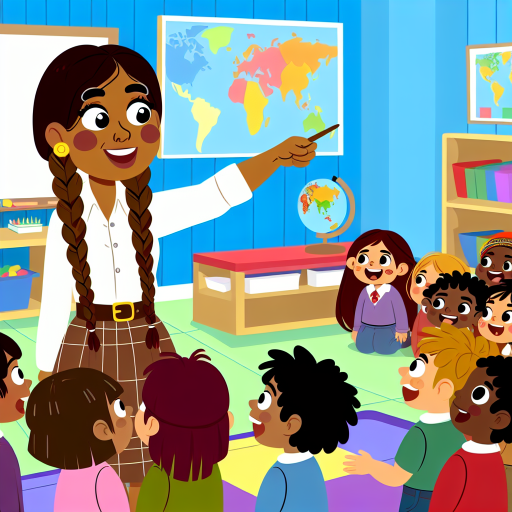Overview of Early Childhood Education and its Importance in Development
Defining Early Childhood Education
Early childhood education focuses on the learning experiences of children from birth to age eight.
It encompasses various programs, including preschools, daycare centers, and kindergarten.
This education lays a foundation for future learning and social development.
Significance of Early Development
During early childhood, brain development is rapid and critical.
Research shows that the first few years greatly influence social, emotional, and cognitive skills.
Children develop essential skills like problem-solving and communication during this phase.
Benefits of Quality Early Childhood Education
Quality early childhood education has numerous benefits for children.
- It enhances school readiness, preparing children for formal education.
- Children in quality programs often perform better academically in later years.
- Such education promotes emotional well-being and social skills.
Equity in Education
Early childhood education plays a role in promoting equity.
Access to quality programs helps bridge the gap for underprivileged families.
This support fosters a more level playing field for all children.
The Role of Educators
Educators play a crucial role in early childhood settings.
They create stimulating environments that encourage exploration and learning.
Additionally, educators build relationships with children, families, and communities.
Community Impact
Communities benefit from robust early childhood education programs.
These programs support working families by providing reliable child care options.
Moreover, they promote community engagement and support networks among families.
Common Workplace Settings for Early Childhood Educators
Daycares
Daycares provide essential services for working parents.
They offer a safe environment for children aged six weeks to five years.
Educators in daycares focus on socialization and basic skills.
They create engaging activities to support child development.
Moreover, educators build strong relationships with families.
Effective communication enhances children’s learning experiences.
Preschools
Preschools cater to children typically aged three to five years.
They emphasize early learning through play-based programs.
Educators design curriculum that fosters cognitive and emotional growth.
Unlock Your Career Potential
Visualize a clear path to success with our tailored Career Consulting service. Personalized insights in just 1-3 days.
Get StartedChildren participate in structured activities and creative play.
Additionally, preschools often collaborate with local communities.
This approach provides resources and support for families.
Elementary Schools
Elementary schools serve children from kindergarten through fifth grade.
Educators focus on foundational academic skills during this stage.
Curriculum includes subjects like math, reading, and science.
Teachers employ diverse teaching methods to meet individual needs.
They foster an inclusive classroom environment for all learners.
Furthermore, teachers partner with parents to support student success.
Roles and Responsibilities of Early Childhood Educators in Different Settings
Overview of Early Childhood Education
Early childhood education plays a vital role in child development.
Educators foster growth through various teaching methodologies.
They create environments conducive to learning and exploration.
Preschool Settings
Preschool educators focus on social and emotional development.
They facilitate play-based learning to enhance cognitive skills.
Their role involves creating lesson plans tailored to young children.
Communication with parents about child progress is essential.
Child Care Centers
In child care centers, educators ensure safety and well-being.
They supervise daily activities and foster healthy interactions.
Additionally, they implement educational programs that align with standards.
Collaboration with parents is crucial for a supportive environment.
Home-Based Settings
Home-based educators provide personalized attention to children.
They often adapt lessons to fit each child’s unique needs.
Furthermore, they create a nurturing atmosphere that promotes trust.
They also guide parents on effective learning strategies at home.
Special Education Programs
Special education educators tailor approaches for diverse learners.
They develop individualized education plans for each child.
Close collaboration with therapists and specialists is vital.
Monitoring progress ensures that goals are being met effectively.
After-School Programs
After-school educators provide support for academic enrichment.
They engage children in activities that spark their interests.
In addition, they promote teamwork and cooperation among peers.
They also communicate with parents regarding the children’s progress.
Community-Based Programs
Community-based programs aim to reach a broader audience.
Educators may conduct workshops and outreach activities.
They collaborate with local organizations to enhance offerings.
Furthermore, they promote family involvement in educational initiatives.
See Related Content: Daycare vs. Preschool Roles for Early Childhood Educators
Impact of Workplace Environment on Child Development and Learning Outcomes
Creating a Supportive Environment
A supportive workplace environment enhances children’s emotional well-being.
Such environments encourage secure attachment between children and educators.
Furthermore, positive relationships foster social development and cooperation.
Physical Space and Layout
The arrangement of furniture influences children’s interaction patterns.
A spacious layout allows for more organized play activities.
On the other hand, cramped spaces can lead to stress and conflicts.
Safety and Accessibility
Safety should always be a priority in early childhood settings.
A well-maintained environment reduces accidents and injuries.
Additionally, accessibility supports children with different needs.
Resource Availability
Access to a variety of learning materials stimulates creativity.
Children benefit from exposure to diverse resources and activities.
This variety encourages exploration and independent learning.
Staff Training and Professional Development
Investing in staff training enhances their teaching practices.
Well-trained educators can better respond to children’s needs.
Moreover, professional development boosts teacher morale and retention.
Collaboration with Families
Engaging families strengthens the connection between home and school.
Open communication fosters trust and encourages parental involvement.
Consequently, children receive consistent messages about learning.
You Might Also Like: Best Practices for Early Childhood Educator Professional Growth
Professional Development Opportunities for Early Childhood Educators in Various Settings
Understanding the Importance of Professional Development
Professional development enhances the skills of early childhood educators.
It promotes innovative teaching strategies and enhances classroom management.
Moreover, it helps educators stay updated with current research and trends.
Types of Professional Development Opportunities
Various opportunities exist for professional development.
Workshops offer hands-on activities and practical applications.
Webinars provide flexible learning options for busy educators.
Conferences create networking experiences for educators.
Online courses allow self-paced learning across a variety of subjects.
Workplace Settings for Professional Development
Different workplace settings offer distinct opportunities for growth.
Childcare centers often provide in-house training sessions.
Preschools may collaborate with community organizations to offer workshops.
Public schools typically have structured professional development programs.
Home-based care providers can attend local workshops and online classes.
Collaboration and Community Involvement
Collaboration enhances the learning experience for educators.
Teacher mentorship programs foster peer learning and support.
Community partnerships can provide additional resources and expertise.
Networking with other professionals broadens perspectives on early childhood education.
Staying Current in the Field
To remain effective, educators must engage in continuous learning.
Reading professional journals keeps educators informed of new trends.
Participating in forums encourages sharing of best practices.
Moreover, pursuing certifications enhances educators’ qualifications and credibility.
Setting Goals for Professional Development
Goal setting is vital for effective professional development.
Educators should identify specific areas for improvement.
Creating a personalized professional development plan can guide learning efforts.
Reviewing and adjusting goals regularly ensures continued growth.
Uncover the Details: Careers in Special Education: How Canada Supports Diverse Learning Needs

Challenges Faced by Early Childhood Educators in Different Work Environments
High Stress Levels
Early childhood educators often encounter high levels of stress in their roles.
They manage multiple responsibilities simultaneously, which can be overwhelming.
For instance, balancing curriculum planning with daily activities may strain their time management skills.
Moreover, interactions with parents and administrators can heighten stress levels.
Limited Resources
Many early childhood settings experience significant resource limitations.
This scarcity impacts the quality of educational experiences for children.
For example, insufficient materials can hinder creative lesson planning.
Furthermore, inadequate funding often restricts professional development opportunities.
Varied Work Environments
Each work environment presents unique challenges for educators.
In public schools, bureaucratic constraints can limit creativity in teaching.
Conversely, private centers often face pressure to conform to business goals over educational quality.
Head Start programs provide diverse challenges due to regulatory compliance needs.
Staffing Issues
Turnover is a recurring challenge in early childhood education.
High turnover rates disrupt continuity for children and strain existing staff.
Moreover, recruiting qualified educators remains a persistent difficulty.
As a result, consistent training and mentorship opportunities become crucial.
Communication Barriers
Effective communication is vital in early childhood settings.
In diverse communities, language differences can create misunderstandings.
Additionally, varying expectations among stakeholders can complicate communication.
Furthermore, educators sometimes struggle to connect with families outside school hours.
Emotional Strain
Working with young children can build emotional challenges for educators.
They often form strong attachments to their students, increasing emotional investment.
Consequently, witnessing challenging home situations can lead to emotional fatigue.
Educators must find effective coping strategies to protect their well-being.
Find Out More: From Classrooms to Screens: How EdTech is Shaping Canadian Education Careers
Regulatory Standards and Licensing Requirements Across Different Workplace Settings
Overview of Licensing Requirements
Licensing ensures early childhood educators meet specific educational and professional standards.
These requirements vary depending on the workplace setting and state regulations.
Understanding local laws helps educators navigate the licensing process effectively.
Types of Workplace Settings
Early childhood educators work in diverse environments.
Common settings include childcare centers, preschools, and private homes.
Each setting has unique regulatory standards and licensing requirements.
Childcare Centers
Childcare centers typically require a state-issued license.
Regulations often stipulate staff-to-child ratios and safety standards.
Furthermore, background checks ensure educator safety and suitability.
Preschools
Preschools may have additional accreditation requirements.
Many states require specific degrees for lead teachers in preschool programs.
Compliance with health and safety codes is also essential.
Family Childcare Homes
Family childcare homes may have different licensing processes.
These providers often undergo home inspections before receiving a license.
Training in first aid and CPR is frequently a requirement as well.
Importance of Compliance
Adhering to regulatory standards is crucial for quality education.
Compliance ensures child safety, health, and well-being in all settings.
Additionally, it supports professional credibility and community trust.
Staying Updated on Regulations
Regulations often change, making ongoing education essential.
Early childhood educators should regularly review their state’s requirements.
Joining professional organizations can provide valuable resources and updates.
Collaboration and Communication Practices Among Educators, Parents, and Support Staff
Establishing Open Lines of Communication
Effective communication is crucial in early childhood education settings.
Educators must prioritize clear and open dialogues with parents and support staff.
Regular updates via emails and newsletters keep everyone informed.
Additionally, schools may hold monthly meetings to foster collaboration.
These practices create a supportive environment for children.
Utilizing Collaborative Tools
Modern technology offers many tools for collaboration.
Platforms like Google Classroom enable seamless interaction among educators and parents.
Shared calendars help coordinate events and important deadlines effectively.
Moreover, messaging apps provide quick communication channels for urgent needs.
Engaging Parents in the Educational Process
Parent involvement enhances children’s learning experiences.
Educators can encourage participation through volunteer opportunities.
Hosting workshops on child development informs parents about supporting learning at home.
Furthermore, inviting parents to observe classroom activities builds trust and understanding.
Building a Supportive Network with Staff
Support staff play an essential role in early childhood education.
Regular team-building activities promote strong relationships among staff members.
Sharing expertise through professional development workshops benefits everyone involved.
Additionally, educators can create mentorship programs to support newer staff.
Celebrating Achievements as a Team
Recognizing collective achievements fosters a positive workplace culture.
Celebrations of milestones can take various forms, from simple acknowledgments to events.
Encouraging team members to share success stories strengthens connections.
Ultimately, a supportive atmosphere improves job satisfaction for everyone.
Additional Resources
Become a registered early childhood educator | ontario.ca
The development of sexuality in childhood in early … – Project MUSE




